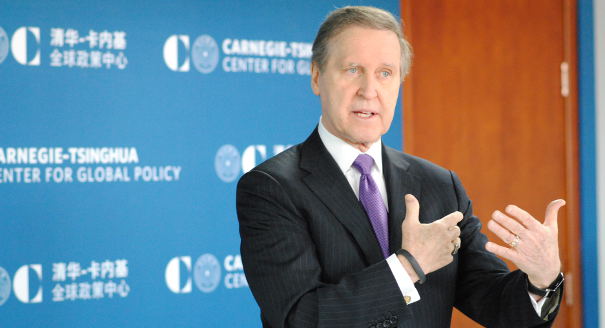{
"authors": [
"William Cohen",
"Paul Haenle"
],
"type": "event",
"centerAffiliationAll": "",
"centers": [
"Carnegie Endowment for International Peace",
"Carnegie China"
],
"collections": [
"U.S.-China Relations"
],
"englishNewsletterAll": "",
"nonEnglishNewsletterAll": "",
"primaryCenter": "Carnegie China",
"programAffiliation": "",
"programs": [],
"projects": [],
"regions": [
"Türkiye"
],
"topics": [
"Political Reform",
"Security",
"Arms Control",
"Foreign Policy"
]
}
Key Security Challenges Unfolding in 2014
Fri, March 21st, 2014
Beijing
Major events of strategic consequence, including the U.S. withdrawal from Afghanistan and Russia’s annexation of Crimea, have already made 2014 a milestone year. Such key security shifts highlight the importance of greater cooperation between China and the United States, as the international community confronts unpredictable and unfamiliar security challenges.
The Carnegie–Tsinghua Center for Global Policy hosted William S. Cohen, former U.S. secretary of defense and chairman and chief executive officer of the Cohen Group, to discuss the global implications of these geopolitical challenges. Cohen also shared his perspective on the current U.S.-China relationship and possible U.S. policy responses to certain security challenges relating to China. The discussion was moderated by Carnegie–Tsinghua’s Paul Haenle.
Discussion Highlights
- U.S.-China Strategic Distrust: Significant changes in both countries’ security policies have led to growing distrust, Cohen said. China’s rapidly growing military budget and lack of transparency has provoked strong concern among U.S. policymakers. In the meantime, the U.S. rebalancing efforts, or “pivot to Asia,” have raised alarm among Chinese policymakers who perceived this policy as an attempt to contain China. Cohen proposed that the United States reassure China that it has no interest in containing China. Similarly, China should provide justification to the United States for its growing military budget.
- Increasing Military-to-Military Exchanges: While military ties between China and the United States have grown over the last several years, more military exchanges and joint exercises could help address the problem of strategic mistrust, Cohen said. Efforts such as the current cooperation in Afghanistan are a positive example. Other potential areas of cooperation are humanitarian relief and post-disaster management, he added.
- Limiting Cyberwarfare: While the United States and China have consistent points of tension over major security and trade issues, both countries also have shared interests in solving key threats to stability, including promoting nuclear nonproliferation in the Middle East or creating cybersecurity norms, Cohen said. Cybersecurity is a particularly strong mutual interest, because of the risk that cyberwarfare could escalate to a direct conflict between China and the United States. Establishing agreed limits within cyberspace could allow both sides to avoid a confrontation, he argued.
- Maintain Key Business Interests: Mutual business interests across the Pacific have been a significant part of the U.S.-China bilateral relationship. Thus, policy initiatives to reduce barriers to free trade between the countries and increase access for small- and medium-sized U.S. enterprises to the Chinese market could improve relations, Cohen added.
Carnegie does not take institutional positions on public policy issues; the views represented herein are those of the author(s) and do not necessarily reflect the views of Carnegie, its staff, or its trustees.
Event Speakers
William Cohen
Paul Haenle held the Maurice R. Greenberg Director’s Chair at the Carnegie Endowment for International Peace and is a visiting senior research fellow at the East Asian Institute, National University of Singapore. He served as the White House China director on the National Security Council staffs of former presidents George W. Bush and Barack Obama.
